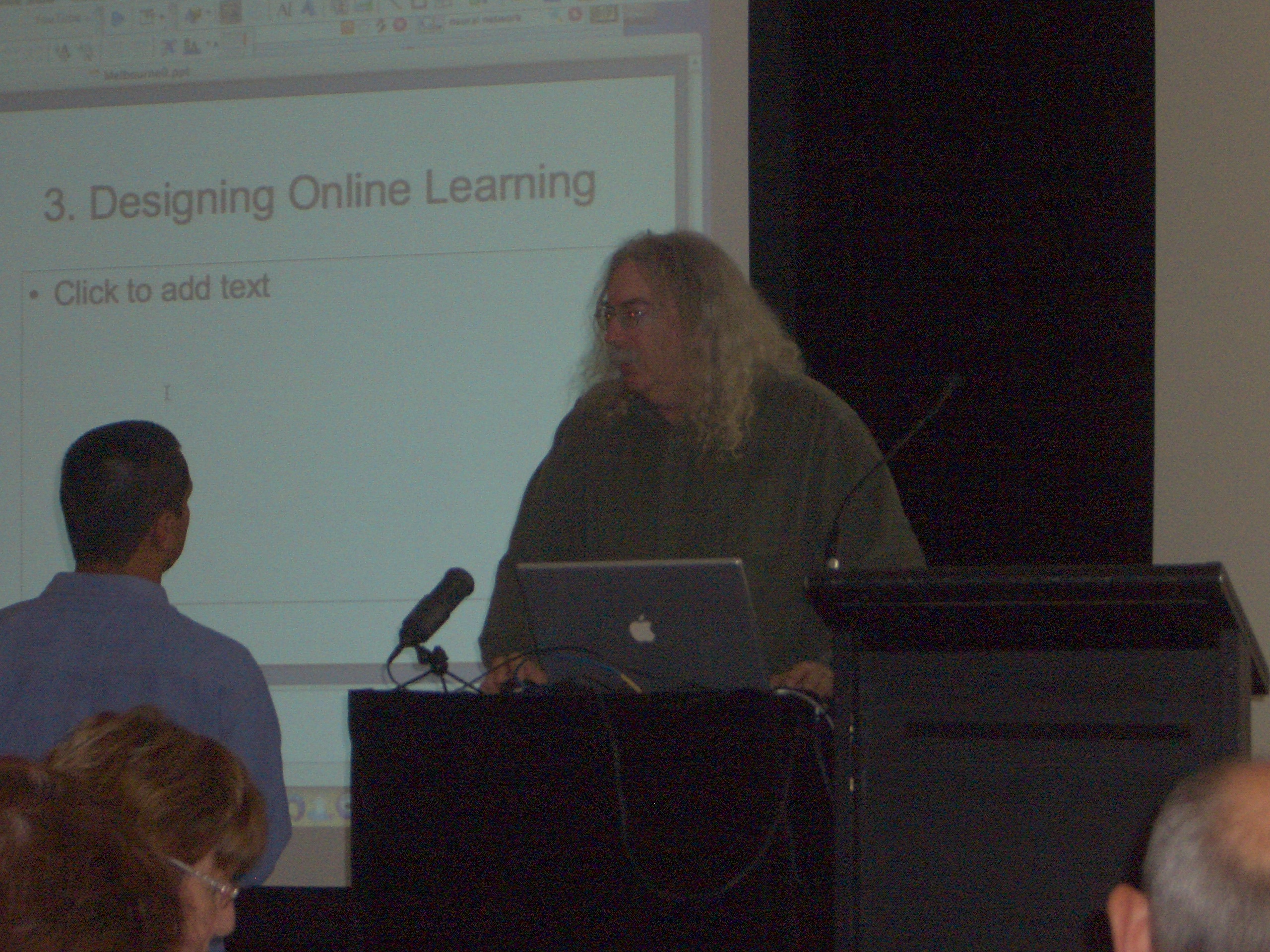
Why did I go to a professional event on the first day of my Easter holidays? Two words: Stephen Downes.
Stephen started by prompting reflection:
Reflect on how you learn in your job today?
How do you learn to use new technology and keep up with events and announcements? How do you learn new policies and procedures?
Then he made an interesting, perhaps controversial, comment. He said
there’s a distinction between the way we learn and the way learning is taking place in universities, etc.
What does that mean?
As I’ve mentioned earlier, my first-year uni son has confirmed for me that he learns in the same way that I did 30 years ago. Lectures and tutorials. Online forum? No. Sharing notes in Google docs? No. Creation of personal learning network using RSS, Delicious or Diigo, or Twitter. Absolutely not.
I know that some tertiary institutions are more progressive with online learning, but these are not the established, traditional ones so sure of their reputation that they forfeit self-assessment. Maybe I’m being unkind. After all, they provide experts. One expert per subject. Are the students learning how to learn in a global context where experts are scattered?
Stephen says we need interactivity in our learning; we need to learn from people. Instead of relying on traditional models of learning, we need to build our own interaction network, placing ourselves, not the content, at the centre.
I’m thinking about secondary school students. A teacher picks the content which is the agenda for learning. What about the interests, the passion of the individual student that could drive authentic learning? Isn’t there room for passion-driven learning in our curriculum?
Stephen says to employ a wide range of technologies to build our network. We need to pick and choose the technologies that are most comfortable to us. Pull is better than push, we should be able to choose our sources. He tells us to speak in our own voice and listen for authenticity; share our knowledge and our experiences, opinions.
We need to make networked learning a habit and a priority. He said someone had coined the phrase ‘interaction is like breathing for the brain’. If interaction isn’t provided, we have to make it ourselves, for example, if we’re at a lecture like this, we should blog it. Hence this post.
Stephen sees information and knowledge as people-centred. That is, we should bring knowledge in, but also translate it into our own way of seeing the world, and then share it, creating a network for people to remix in their own way. This is one of my favourite new concepts of knowledge – it evolves depending on who does what with it; we’re all unique, and so is our take on knowledge.
But how do we control knowledge as we pull it in? We simplify it, and summarise it in our own words, using our own vocabulary. Make it relevant to us, take what’s important to us now. Shouldn’t students be taught to learn this way?
And then it really got interesting. Stephen said, it’s better to shun formal lectures (certain irony here) in favour of informal learning, eg. the Google Reader approach to learning; learning from people we’ve decided we want to speak to us.
And what about this: Do connect to your work at home and on vacation but feel free to sleep at the office; most work environments are dysfunctional;your learning takes place when it takes place. Your best time might not be 9 to 5; ideas and learning happen when they happen.
And here’s one for those of you who, like myself, often feel overwhelmed by the flood of knowledge they’ve pulled down on themselves. You don’t want to assimilate all that knowledge. Let go, it will come back if it’s important; information is a flow, not a collection of objects.
Self-directed learning is a theme with Stephen. You and nobody else is reponsible for your own learning. These principles ought to inform how we teach as well as how we learn, and that’s what connectivism and Learning 2.0 is all about. Self-directed learning rejects passivity, so get up and walk out if what you’re hearing doesn’t interest you. Be pro-active; take responsibility for learning.
There’s a lot more to Stephen’s talk than I’ve managed to outline here. This will do from me.
Have a look at the Connectivism and Connective Knowledge Online Course. created by Stephen and George Siemens.
If I had to say one thing that I came out thinking about today, it would have to be that learning is personal, and that we must be pro-active about finding, organising and creating our own knowledge, about what we learn and who we learn from. And in this way, if we learn transparently, we model learning for our students.


